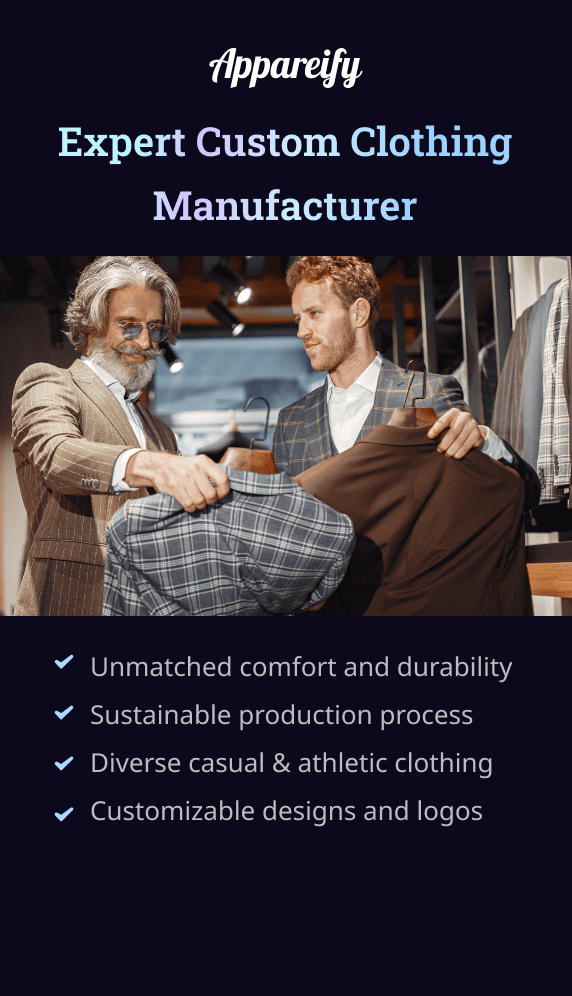Private label clothing is a lucrative aspect of the fashion industry that puts smaller brands on a similar pedestal to bigger ones. It can be one of the best ways to keep the quality of your products top-level while gaining brand recognition quickly. Some examples of popular private label clothing brands include C&A by Target, H&M, and Kirkland Signature (Costco).
If this sounds like something you would like to do but have no idea how to start, this article is for you. Here, you will learn everything you need to know about starting a clothing brand from scratch using a private label clothing business arrangement.
Ready? Let's go!
What Is Private Label Clothing?
Private label clothing (also known as branded apparel), refers to a win-win business arrangement where a retailer collaborates with a manufacturer to produce the clothing items that the retailer collaborates will brand, market, and sell.
In other words, instead of purchasing branded items to sell, the retailers make their own branded clothes by outsourcing the manufacturing process to another company. They get to specify their requirements, such as fabric choice, size, quality, design, color, etc., based on customer demands.
When the clothing items are manufactured, they brand them as if they were the manufacturers and sell them to customers with their own labels or logos.
This collaborative arrangement has attractive benefits for both the retailers and the third-party manufacturers. The retailers can run their own clothing line without worrying about manufacturing equipment and processes, while the private label clothing manufacturers can focus on production only without wondering whether the clothes will sell or not.
As such, with this arrangement, both parties can focus on their strengths without entangling themselves in the complexities of the other company's responsibilities. Private label clothing also offers mouthwatering financial benefits for both parties.
Private Labeling vs. White Labeling
It is easy to confuse private labeling with white labeling. However, even though they're similar, they are not one and the same thing. With private labeling, the retailer enters into a partnership with third-party manufacturers to produce items based on their specifications. This means they get customized products that are unique to them.
However, with white labeling, the retailer buys generic or already-made items to brand and sell. As such, it's possible to have many retailers branding the same products. This means that they have no clothing items that are elusive to them and have less control over the quality of their products. These are the key factors that make private labeling more appealing to entrepreneurs than white labeling.
Why Should I Choose Private Label Clothing?
Private label clothing provides numerous advantages for retailers, especially those who already have an established customer base. Anyone who wants to start a clothing brand using this business model can expect the following benefits:
1. Improved Quality Control
One of the most valid reasons to venture into private label clothing is that it gives you the authority to control the quality of your clothing items. When working with a private label manufacturer, you get to instruct them on the quality standard you want to achieve. You can also supervise every stage of the production process, from materials sourcing to packaging.
This ensures that you can provide quality assurance to your customers and deliver products that align with your brand goals.
2. Cost-Effectiveness
Private label clothing is a great option for brands that want to save money while launching their own product lines. First of all, it eliminates manufacturing costs as you don't need to budget for expensive manufacturing equipment and facilities. Private label clothing also cuts labor costs to the barest minimum. You can also take advantage of the discounts manufacturers offer for bulk orders.
3. Greater Profit Margins
Besides saving significant costs, private label clothing also gives you opportunities to increase your profit margins. Since you are getting customized products, this business arrangement is pretty similar to a monopoly in some ways as it allows you to set your own retail prices. As such, you will be able to make more profit per unit of sold items compared to white labeling and other business structures, especially because your manufacturing costs are low.
4. Brand Loyalty
You can strategically improve your brand perception and image by opting for private label clothing. Since many customers love to buy fashion items, they will keep coming back for more once they discover that your brand offers elusive products. You can also customize your products to suit specific clients' needs and tastes while also creating a unique story to enhance your brand loyalty.
5. Fast Sales
Not only are you likely to enjoy increased sales as a private label brand, but you also get to sell out fast. Again, this is all thanks to the customized products that you offer. The fact that your products are unique and of high quality will attract many customers who have been looking for just that. These kinds of customers typically don't waste any time or need too much convincing when making purchases, as your products already match their values and preferences.
6. Streamlined Process
As a private label brand, you don't feel the need to interact with intermediaries as you source your products directly from the manufacturer. This creates a streamlined process that eliminates the complexities of the traditional supply chain.
You will also be able to streamline your marketing efforts to meet the needs of a smaller target audience that is more likely to patronize your brand compared to regular retailers.
7. Improved Flexibility
Since fashion trends are always changing, your success in the industry depends largely on how well you can also adapt your product offerings to suit new tastes and preferences. With private label clothing, this is a walk in the park.
Unlike other retailers, you can quickly change your designs to align with evolving fashion trends since you have direct control over the manufacturing processes. This ability to adapt easily helps you to stay relevant in the industry while experimenting with new styles.
How to Start a Clothing Brand Using a Private Label Business Model
Now that you understand the benefits of having a private label brand, how do you make it work for you? Starting a clothing brand as a private label company can be challenging if you are not proactive in making it work.
Fortunately, there are specific tips to follow to ensure your success using this business model. These are the most essential ones:
1. Understand Your Target Audience and Market
The first step to success in private label clothing is identifying and understanding who your potential customers are. What kind of customers do you want to attract? What are their age brackets? What apparel, colors, and designs do they like?
Also, conduct market research to understand what is selling fast at the moment. With the right information, you will not only be able to narrow down your options but also make informed decisions on the best private label manufacturer for your brand.
2. Choose the Appropriate Type of Private Label Apparel
After conducting your market research, the next step is to use the information gathered to choose the suitable type of clothing to specialize in. From sportswears to loungewear, underwear, nightwear, etc., there are a lot of options to choose from.
Whatever you choose, make sure that it strikes the perfect balance between your brand's values, what you are passionate about, and customers' needs.
3. Develop a Business Plan
Everything is easier with a detailed plan. When you take your time to create a quality business plan, it will serve as a roadmap to ensure that you are always on the right track toward sustainable growth. Business plans also help to clarify your vision, allocate resources properly, conduct risk assessments, and measure progress over time.
Your business plan should include an executive summary, a description of your business, market analysis, financial projections, detailed product line information, and organization and management details. It should also contain your SWOT (strengths, weaknesses, opportunities, and threats) analysis, operational plan, and marketing strategy.
4. Source a Reliable Clothing Manufacturer
Your choice of private label manufacturer is so important that it can make or break your chances of growth. In private label clothing, your manufacturer is like a partner who handles a very important part of the business. If they are unreliable, your customers won't be able to trust your brand.
When sourcing private label clothing manufacturers, consider their qualifications, experience levels, and reputation for producing quality products. Also, consider their capacity to produce the units you need per time, production techniques, customization options, pricing structure, and responsiveness. Finally, regardless of the company you choose, male sure that their values align with yours.
5. Sample Products
Make sure that your potential manufacturer offers sample testing. This affords you the opportunity to evaluate the design, quality, etc., and check that they meet all your requirements before making further commitments to the production process. When you are satisfied with the samples, you can then finalize your agreement with the private label manufacturer and start bulk production. Be sure to supervise the various stages until completion.
6. Customize Your Private Label
Now is the time to create and launch your unique label and customize it with a distinct and attractive logo and packaging style. You should put a lot of thought into creating your private label as it plays a significant role in shaping your brand image and recognition.
With an appealing and unique label, you will be able to differentiate your brand from your competitors. It will also ensure that your customers always remember to patronize your company whenever they need your product offerings.
7. Prioritize Product Merchandising
Whether you want to operate an eCommerce website or own a physical store, product merchandising is a very important part of a private label clothing business. With proper merchandising strategies, you will be able to attract more customers and improve sales by subconsciously influencing their buying decisions.
The aim of product merchandising is to complement your marketing efforts by making your clothing items more appealing to your audience. You can do this by using catchy product descriptions, selecting your color schemes carefully, uploading high-quality images, optimizing packaging, creating attractive product displays, etc.
Also, be sure to advertise your products on platforms your target audiences visit regularly, such as social media. You may also decide to launch campaigns to ensure that more people are aware of your offerings.
Source Your Private Clothing Items from Appareify Today!
If you have read this article to this point, you now know everything you need to confidently start your private label clothing business. Kudos to you!
Always remember that a lot depends on the expert craftsmanship and reliability of your manufacturer. No matter how well you play your part in ensuring that your business is successful, your efforts will be wasted if you work with an irresponsible manufacturer.
To be on the safe side and avoid business frustration, Appareify is a smart choice of private label clothing manufacturer for brands that know their stuff. As a first-rate custom clothing manufacturing company, you can trust us to provide top-notch bespoke clothing solutions to suit your brand's unique needs.

Our team of professionals is always ready to ensure that your requirements are met to the smallest detail. We only work with reputable suppliers to guarantee superior quality products and work with advanced equipment to make your dream come true. We are an eco-friendly brand and offer the best value for your money.
Contact us today for more information on how you can partner with us to build the private label brand of your dreams.

